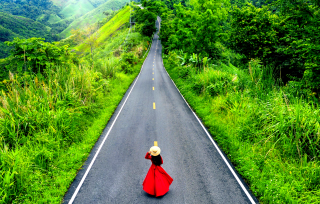Autism
Adult, Accomplished, Autistic: The Late Diagnosis Diaries
Late diagnosis can be a major adjustment, especially when others doubt us.
Updated August 5, 2023 Reviewed by Davia Sills
Key points
- Late diagnosis of autism often brings mixed feelings—from regret to relief.
- Others can meet late autism diagnoses with doubt and dismissal grounded in stereotypes and misconceptions.
- However, adult diagnosis is not rare. Many grew up before autism was better understood.

“You can’t be autistic.”
“You are a grown-up.”
“You are successful.”
“You are nice.”
“Are you sure? You are way too… [smart, caring, whatever it is about you that doesn’t align with the other person’s idea of autism].”
And in some cases—“but you are a woman!”
As someone who was diagnosed very late, I’ve heard all these things and more. Let’s look at some of the myths and stereotypes that prevent people from seeing us as we are. And then let’s talk about celebrating who we are regardless of what others may think or say.
But you are a grown-up!
Yes. And that is a problem. When GenXers and even older Millennials—not to mention earlier generations—were children, autism diagnosis was rare. Boomers? Forget it. And even in younger generations, many were still missed. Especially women, people of color, or people from less affluent communities.
We were just called names and told to try harder to be like everyone else. Which is utterly unhelpful when you are wired differently. And the different wiring does not go away. Diagnosed or not, autistic kids become autistic adults.
But you are so empathetic!
The stereotype that individuals with autism lack empathy is a major misconception.
The relationship between empathy and autism is complex. Autistic people differ in empathy—just like everyone else. Most desire relationships just as much as allistic (non-autistic) people, and many are extremely caring. Autistic people can experience empathy and other emotions intensely, to the point of feeling overwhelmed. This empathy often extends not only to other people but also to animals and global issues. Some, however, may struggle with expressing empathy—about 50 percent of autistic people have alexithymia, a difficulty with identifying and labeling emotions they experience.
The key issue in interactions with neuromajority individuals that are often labeled as “autistic lack of empathy” is not an “autistic deficit” but a dual empathy problem. This means that neuromajority individuals lack empathy toward autistic people and engage in automatic biased and exclusionary behaviors, such as avoiding conversations, rejecting autistic individuals’ attempts at social connection, ostracism, and bullying.
Discovering that others have automatically disliked you all your life—no matter how hard you tried to fit in—can be quite a shock. Yet, it can be liberating if we realize that this is not our “fault.” Nor do we “deserve it,” as we are often gaslit into believing. We are not “broken neurotypicals”; we are just different. And bullying and abuse are not appropriate ways to deal with differences.
But you are so talented/successful/accomplished/eloquent!
Highly intelligent or gifted individuals are likely to be missed in autism and other related diagnoses. Talents can mask challenges. But talents do not mean we do not struggle. We can deliver top-notch presentations at work and then collapse at home. We can give our all to the team-building day and then be unable to sort our mail for a week. Or a month. Or a year.
People do not see the struggle. If we are mentally classified as “achievers,” people are puzzled if there is something we can’t do. If we complain, they think we are not trying hard enough. That we are lazy. That we are being difficult on purpose. And then they punish us. So, we keep going and striving—until we burn out. And that just might lead to a diagnosis.
The big “Now what?”
Navigating a late autism diagnosis is not a walk in the park. I know that for me, it stirred up much emotion—and most people have similar accounts. For many of us, late diagnosis can bring on a range of feelings, from relief to regret, from grief to giddiness. There is sadness and a sense that some of life’s struggles could have been avoided. There is the relief of finally knowing. There is the joy of finding “your tribe.”
And there is still the struggle of disbelief, dismissal of our needs and requests, and outright discrimination.
There is only so much we can do about other people’s choices. But we can focus on making the best choices for ourselves.
Because we do have a new set of choices. Not necessarily easy, but better informed, more authentic choices. Choices to say yes to something we always wanted to do but were worried about the judgment of others. Choices to say no to things we’ve been doing trying to please people who would not be pleased. Choices to let go of relationships that do not support who we are and to nurture the special ones that do. There is learning with those who would learn with us.
Some choices are harder than others. Like forgiving people and letting go. We often feel frustration or resentment toward those who may have mistreated us. Valid feelings and justified. And so, so burdensome. Holding onto them can hinder our ability to move on. Forgiving others does not mean absolving them; it just means liberating yourself from carrying the weight of their choices.
We have our own choices to think of. Like a choice to accept ourselves and our journeys, with the hard lessons and dearly bought learning. A choice to share this learning to make someone else’s journey a little easier.
And my favorite choice—to celebrate. I was never taught to celebrate myself. Self-improve, self-critique, self-tear-down, but not self-celebrate. Learning to celebrate, honor, and accept ourselves makes a difference.
It is our chapter to write. We can fill it with “you do you.” Life is sure to have its ups and downs, but we can make it our ups and downs of pursuing authenticity—and not something imposed on us. This can mean traveling the world or staying in and reading books, learning to do something we always wanted to learn, or making time for more rest. Trying something completely different. Or gratefully accepting where we are and contentedly staying there. Baby steps for exploring what works for us are just fine.




